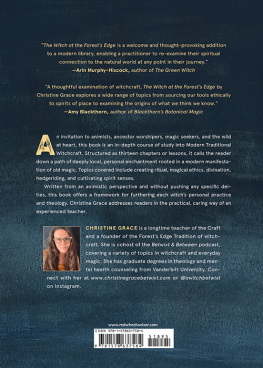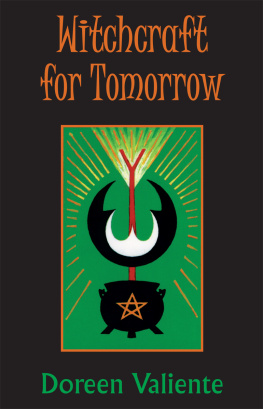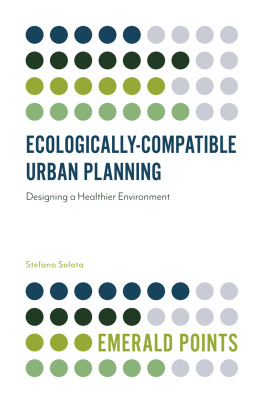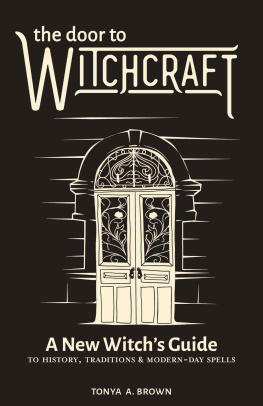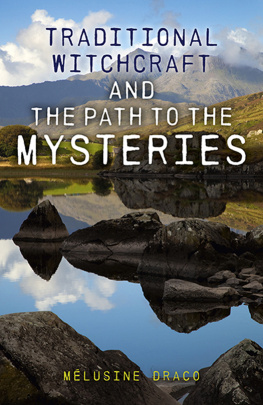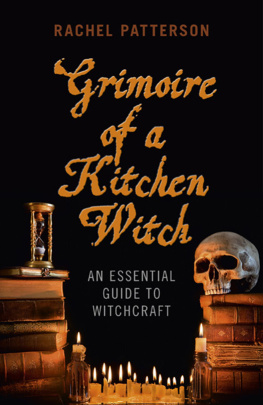Author biography
Writing as Mlusine Draco, the author has been a magical and spiritual instructor for over 20 years, and writer of numerous popular books including Liber Agyptius: The Book of Egyptian Magic; The Hollow Tree, an elementary guide to Qabalah ; A Witchs Treasury of the Countryside; Root & Branch: British Magical Tree Lore and Starchild: a rediscovery of stellar wisdom. Her highly individualistic teaching methods, as used in Traditional Witchcraft for Urban Living, draw on historical sources, supported by academic texts and current archaeological findings.
Chapter One A Pagan Perspective
If much of todays pagan propaganda is to be believed, anyone who doesnt live a stones throw from, or have regular access to the rural heartlands of England, is hardly qualified to call themselves pagan. And if the unfortunate town-dweller cant be found at weekends rooting about in country hedgerows, then witch is also a label to which they apparently have no right!
Tosh, tosh! And thrice tosh!
Yes, of course, we can haul out the old chestnut of pagan deriving from the Latin pagus, which properly means belonging to a village but it was used in a derogative sense, just as contemporary town dwellers might refer to country folk as swede bashers or carrot crunchers. Long after the Christian Church was first established in the cities and towns (centres of learning), what they saw as idolatrous practices continued to be observed in rural districts and villages, so pagan and villager came to mean the same thing. Similarly, the word heathen (from the Anglo-Saxon hthen, hth) referred to a dweller on a heath or common. Christian doctrine would not have reached these remote people until long after it had integrated town and city, and in both cases, pagan and heathen implied a lack of worldliness, sophistication and learning. It was intended as an insult.
In contemporary society, pagan is now the accepted umbrella term for those who follow any eclectic, reconstructionalist doctrines of pre-Christian beliefs, while heathen tends to refer more specifically to those of the revivalist Norse traditions. Ironically, the vast majority of followers of both traditions live in towns and cities. And lets face it, people live in urban communities for a variety of reasons: the most common being the close proximity to work and/or family.
For the witch whose career confines them to an urbanised environment, regular Craft practice may often seem like a futile gesture, especially if home is a small, gardenless-flat. Even the suburbs can be magically incapacitating, if there is constant noise from traffic and neighbours. People work long hours; often setting off for work and getting home again in the dark during the winter months, without having the opportunity to notice the subtle changing of the seasons. Weekends are a constant battle with family commitments, domestic chores and socialising. Its no wonder that the urban witch has little time or strength left for magical and spiritual development.
There are, of course, others who find themselves having to remain town and house-bound because of age or disability; because they are caring for an aged/infirm parent, or partner; or because they have small children. Urbanisation often provides on-the-spot facilities to make things easier on the domestic front but it cannot give the one thing that a witch needs most privacy and spiritual elbow-room.
So how do we manage?
We get up close and personal. And we reject the textbook clichs of what is, and what is not, recommended witchcraft practice. We do not follow stereotyping when it comes to when, where and how we perform our rituals simply because it may not be practically possible to follow the instructions to the letter.
For example:
I am a Welsh witch and I come from a place midway between the mountains and the sea, but I have not lived in my homeland now for many years. It would be untrue to say that I never experience what the Welsh call hiraethus, that indescribable feeling of longing and home-sickness, but as we all know, in magical terms there is always a price to be paid for our Craft. During those long years, my career and domestic life has taken me to London (where I lived for 20 years), to the industrial Midlands and, more recently, to a totally urbanised area of East Anglia. Not once, in all that time did I have the luxury of wild, open spaces it was all concrete and asphalt. But not once, in all that time, did I stopbeing areal witch.
In my experience, the greatest problem a solitary urban witch faces is that an urban environment is not user-friendly when it comes to psychic activity, but then we dont always have a choice of where we are going to live if someone elses needs have to be catered for, too. Mostly I have been confined to renting small terraced cottages and flats, often with little or no garden to give that extra bit of space. I make this comment merely to demonstrate that my Craft activities have not been conducted in a round of luxurious city apartments and picturesque Grade II listed town houses!
Under these circumstances, for me the key words have always been: acclimatise, adapt and improvise. Any animal, plant or person that is uprooted and transported to another environment quickly learns to acclimatise if it is going to survive. I have adapted to my surroundings and drawn on whatever material/energy there is to hand, even if it is not what Ive been used to working with. I improvise by drawing on existing knowledge and experience. So
Acclimatise:
Accustom yourself to tuning-in to your environment, even if youve lived there for some time. Try to imagine visiting the place for the first time. Buy a detailed street map or guidebook, and familiarise yourself with all the hidden nooks and crannies in the immediate vicinity. Is there a park nearby? Public gardens? Churchyard? Cemetery? What trees are growing locally? Which are the most important/attractive buildings? Where is the nearest river or canal? Where is the oldest church? Take your time explore rediscoveracclimatise.
Adapt:
Modify or adjust the way you look at things. There is no point in wishing you were elsewhere when circumstances dictate that you remain where you are. But on the other hand theres nothing quite so mind-numbing as doing the same thing, day in day out, for weeks on end. For a change, try walking to the shops, school, or travelling to work, via a different route. Examine whats growing in all the front gardens along the way to the shop, school, station or bus stop. Make sure you take time out for lunch - and get out of the home or working environment for an hour - even if its a wet Wednesday afternoon: after all, a witch shouldnt be afraid of a little drop of Elemental Water! Start seriously interacting with your environment adapt.
Improvise:
Be prepared to perform a magical working at any time, without preparation, and without what is considered to be the proper regalia. Be aware of the magical signs Nature has to offer and be ready to act spontaneously, even in the middle of a crowded railway station or shopping mall during rush hour! It may also come as a bit of a shock to realise that a large number of books mentioned in this text are not about witchcraft, or written by witches. This is because we are learning to improvise and look at things from a different or unexpected perspective.
Before we go out and meet Nature face to face, however, there may be one or two changes needed to enable us to re-connect with the natural, elemental energies that are an essential ingredient within any magical environment. Sorry were not talking about symbolic bowls of water, salt, night-lights and a joss stick to mark the quarters on the sitting room rug, were talking about encountering



